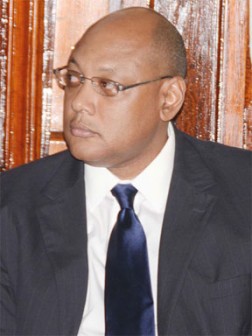Raphael Trotman readily concedes that the political tumult that preceded his belated emergence as the Speaker of the National Assembly makes his eventual accession to office a wholly unexpected turn of events. “When push came to shove I became a compromise candidate,” he says.
The confession comes fluently, without even a hint of what one might call the prevarication and ambiguity that characterizes the politician’s proclivity for saying one thing and meaning another. Trotman feels no need to do a diplomatic waltz in explaining the surprising turn of events that has placed him in the Speaker’s chair.
Not that there is even a hint of self-doubt about his credentials. “I consider myself to be just as capable as the other candidates whose names had been submitted.” The mission of his tone is clear. He wants to leave no doubt that he intends to rise to the occasion.

Ironically, the Attorney-At-Law and – at least for a while longer- co-Leader of the Alliance For Change (AFC) appears to have landed just the job he wanted. It affords him the opportunity of refashioning his political self, satisfying his stated desire to “disengage from our confrontational style of politics and work in a reconciling setting.’ That, presumably, is very much the reason why he does nothing to disguise his satisfaction with his new job and why he has announced that he will not be seeking re-election to the leadership of the AFC. If Trotman were a professional boxer one might say that having graced the ring to do battle he now re-enters in the role of a referee.
He had placed himself in the race for the Speaker’s job shortly after the results of the November 28 general elections were known. Afterwards, with the political storm clouds billowing over who should get the job, he had withdrawn, subsuming his ambition beneath the wishes of his party. “The executive, including me, had decided that Moses Nagamootoo was the most suitable candidate in the circumstances.” That was his way of conceding that he had lost the race for his own party’s nomination and had, thereafter, removed himself from the public discourse on the matter “so as to ensure that the AFC presented a united and solid front.”
Arguably, he could have insisted on his own candidature. His stature as a party leader would have meant that his insistence could not have been ignored. What he appeared to be sensing, however, was that the controversy might have extended to the point where what he believes are the political gains which the country, as a whole, secured from the outcome of the general elections, might have been hopelessly compromised, perhaps even irretrievably lost.
As it happened, Moses Nagamootoo, after his own candidature had apparently become a non negotiable issue with the PPP/C, reciprocated Trotman’s statesmanship, withdrawing from the race and paving the way for him to get the job.
If Trotman might have been uneasy over the fierce political confrontation that characterized the process of electing a Speaker he appears to believe that, in the end, it might have served a sobering political purpose… the re-enforcement of the reality that the elections had brought about a significant shift in the country’s political centre of gravity. “Everyone, politicians and citizens alike, realized that there was a new political dispensation and that the 10th Parliament would be different from any other,” he says. What that meant, in his view, was that “the Speaker’s chair became, as important, for all intents and purposes, as the President’s office.”
It is the departure from the ‘tradition’ of a National Assembly in which the government holds a working majority that lends attention to the role of the Speaker. Trotman envisages his role as that of a “Minister” of the Parliament. The Clerk, he says, is “like the Permanent Secretary.” Nor does he underestimate the challenges of his portfolio. “Given the tenuous majority enjoyed by the Opposition, the Speaker will be very important to maintain order and to ensure that both the Government’s and Opposition’s agendas are facilitated. This is likely to be an exciting parliament, and the Speaker’s resolve, and acumen will be tested and pushed to the limit.”
If he is not unmindful of what could be the challenge of protecting the Parliament from itself, he appears decidedly underwhelmed by the magnitude of the task. His foremost preoccupation is with what he sees as a unique opportunity to help alter the political landscape. “There is,” he says, “a new wave of democracy and accompanying great expectations rolling through the land and the Speaker will be expected to ensure that as many, if not all of the people, through their representatives ride this wave towards a better life.”
If the 10th Parliament is still very much in its infancy the Speaker appears to have already set himself an agenda which goes way beyond overseeing the exchanges in the House. He talks about his role in “rebuilding parliamentary democracy” and ensuring that the National Assembly is an “important, prominent, independent and representative arm of government.” He seeks both recognition and respect for Parliament; and he envisages more.
He wants Parliament to become “the preeminent place of the people’s decision-making process…attracting members of the public, ensuring training and overseas attachments for staff and MPs, putting MPs into greater contact with the people, recognising Past-Presidents and Speakers, and raising the awareness of the work through the social media and other means.” He seeks, he says, to be ‘passionate” about these things.
Somehow, you get the feeling that Raphael Trotman’s election as Speaker of the National Assembly has perhaps afforded him the opportunity to pursue his real political calling. He talks about his “passion .for inclusivity in decision-making, healing, reconciliation and the setting aside of adversarial and confrontational politics.” He believes, he says, that the 10th parliament will be defined as the Parliament of “compromise and consensus” and the ideal vantage point from which to pursue his own convictions. If he concedes that he will miss the combative environment of “the floor” he comforts himself in the fact that “we sometimes have to give up some things to achieve the greater good.”
Arnon Adams









